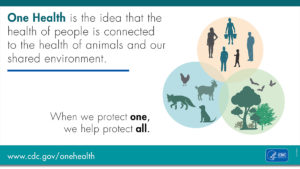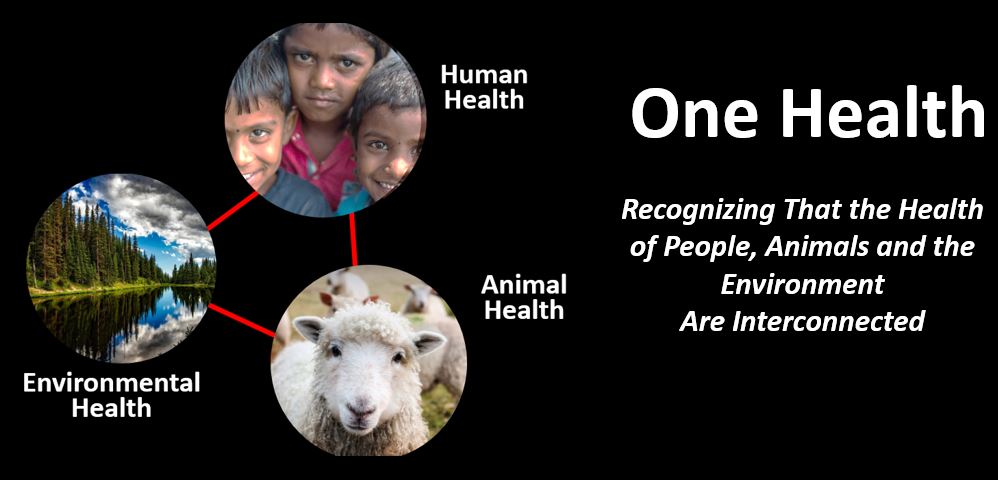By Allison Kozicharow; Edited by Elizabeth Fine
Zoonotic diseases. Climate change. Food and water safety. Antibiotic resistance. What ties these topics together?
One Health is a crucial tool for early disease surveillance, according to a Medscape article.
 The majority of infectious diseases are zoonotic, meaning they spread between animals and humans. Recent years have ushered in an unprecedented emergence in diseases — such as West Nile virus, Ebola, Zika, COVID-19 and Mpox — that carry epidemic or pandemic potential.
The majority of infectious diseases are zoonotic, meaning they spread between animals and humans. Recent years have ushered in an unprecedented emergence in diseases — such as West Nile virus, Ebola, Zika, COVID-19 and Mpox — that carry epidemic or pandemic potential.
Antibiotic-resistant germs can quickly spread through communities, the food supply, healthcare facilities and the environment (soil, water), making it harder to treat certain infections in animals and people. Vector-borne diseases (spread by animals, including insects) are on the rise with warmer temperatures and expanded mosquito, tick and other vector habitats. Pollution directly endangers all life on the planet, and it contributes to climate change, which increasingly is threatening life everywhere.
WiRED International frames the training modules in our Health Learning Center within the delicate balance of One Health and incorporates its principles into our program for community health workers (CHWs). WiRED CHWs are trained to serve in health surveillance teams to detect and report wider health issues in the community before they spread. Besides recognizing signs and symptoms of disease, CHWs teach their communities about disease prevention, including proper sanitation, water purification and the safe handling of food.

Conditions of a fast-changing global environment have accelerated how and where humans and animals interact and reshaped the health implications of their encounters. Sadly, the world’s underserved communities suffer the most from all the ills of poverty, including a lack of health care, hunger and rapid onset of communicable diseases.
WiRED is ever mindful of the social and environmental determinants of good health, which are access to medical care, clean air, safe drinking water, sufficient food and secure shelter. One Health vigilance is key to global good health.
The Importance of a One Health Perspective in a Changing Environment
In 2018 WiRED marked the publication of an article on One Health in The Medical Journal of Southern California Clinicians (MJSCC) entitled, “The Importance of a One Health Perspective in a Changing Environment.”
The MJSCC article is co-authored by WiRED International Director Gary Selnow, Ph.D.; Western University professor and WiRED board member, Miriam Othman, M.D., M.P.H.; and Western University professor, Malika Kachani, Ph.D., D.V.M. The authors cover the history of human and animal health, the logic of One Health thinking, zoonotic diseases and the role of healthcare professionals in the One Health program.
The authors conclude: “It is becoming ever more evident that we cannot think about human health in isolation. …. At the end of the day, it may fall to medical and veterinary practitioners, who see impacts on the ground, to be certain the One Health view is represented in critical policy discussions at the local, regional and global levels.”



